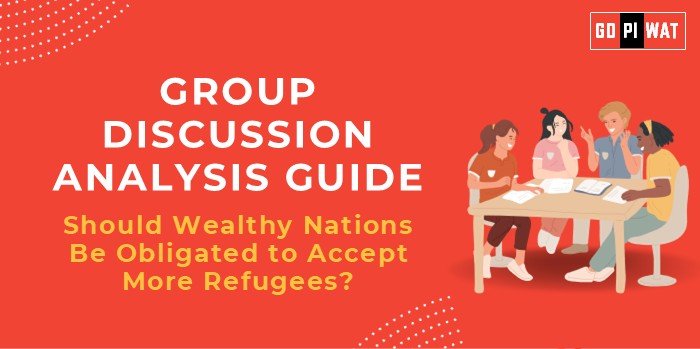📋 Group Discussion (GD) Analysis Guide
🌍 Topic: Should Wealthy Nations Be Obligated to Accept More Refugees?
🔎 Introduction
The global refugee crisis has intensified, with over 35.3 million refugees worldwide as of 2023, predominantly from conflict-affected countries like Syria, Afghanistan, and South Sudan. This issue underscores the disparity in global responses, as wealthy nations, despite their economic capabilities, host a small proportion of refugees. The debate on whether they should bear a greater responsibility delves into ethical, economic, and geopolitical dimensions.
📊 Quick Facts & Key Statistics
- 🌍 Global Refugee Population: Surpassed 35.3 million in 2023; over 70% originate from five conflict-affected countries.
- 🇹🇷 Top Refugee-Hosting Countries: Turkey leads with 3.6 million refugees, followed by Germany with 2.2 million.
- 💵 Economic Contributions: Refugees contribute $63 billion annually to host economies via labor and entrepreneurship (UNHCR, 2023).
- 🌐 Wealthy Nations’ Refugee Intake: Despite controlling 60% of global GDP, high-income nations host only 15% of the world’s refugees, while low-income nations host 40%.
👥 Stakeholders and Their Roles
- 🤝 Host Governments: Develop asylum policies, allocate resources, and manage integration.
- 🌍 International Organizations (UNHCR): Provide funding, logistics, and advocacy.
- 🗳️ Citizens of Host Countries: Influence refugee policies through public opinion.
- 🏠 Refugees: Seek safety and contribute to host economies and societies.
🏆 Achievements and Challenges
✔️ Achievements
- 💰 Economic Benefits: Refugees contribute significantly, generating $63 billion annually for host economies.
- 🇩🇪 Successful Models: Germany integrated over 2.2 million refugees, strengthening its labor market.
- 🇨🇦 Humanitarian Leadership: Countries like Canada have set examples through community sponsorship programs.
⚠️ Challenges
- 🗣️ Public Sentiment: Host populations often resist due to economic and cultural concerns.
- ⚖️ Disparity in Responsibility: Wealthy nations host a disproportionately low number of refugees.
- 🏘️ Integration Struggles: Housing, education, and healthcare services are often strained.
💡 Effective Discussion Approaches
Opening Approaches
- 📊 Statistical Impact: “With high-income countries hosting just 15% of refugees despite controlling 60% of global GDP, the disparity in responsibility is stark.”
- 🌏 Humanitarian Framing: “Refugee protection is a moral imperative, rooted in human rights and international law.”
Counter-Argument Handling
- 💰 Cite economic contributions such as the $63 billion generated annually.
- 🇩🇪 Reference successful models like Germany and Canada to counter skepticism about integration challenges.
🔍 Strategic Analysis of Strengths & Weaknesses
- ✔️ Strengths: Economic capacity, advanced infrastructure, and technological capabilities.
- ❌ Weaknesses: Political resistance and societal divisions.
- 🌟 Opportunities: Leverage refugees’ skills for economic growth; strengthen global leadership.
- ⚡ Threats: Rising populism, political instability, and resource strain.
📚 Structured Arguments for Discussion
- 💼 Supporting Stance: “Wealthy nations must lead refugee resettlement efforts, given their economic and infrastructural capabilities.”
- 🏘️ Opposing Stance: “Hosting refugees should be proportional to nations’ geographic proximity and current population densities.”
- ⚖️ Balanced Perspective: “While wealthy nations must accept more refugees, a multilateral framework ensuring global burden-sharing is essential.”
🏫 Connecting with B-School Applications
- 📊 Real-World Applications: Policy analysis in international relations, migration economics, and global governance.
- 💡 Projects: Economic integration, diversity management, and labor market adaptation.
Sample Interview Questions
- 🌍 “What lessons can wealthy nations learn from Turkey’s and Germany’s refugee policies?”
- 🤝 “How can international organizations improve burden-sharing mechanisms?”


